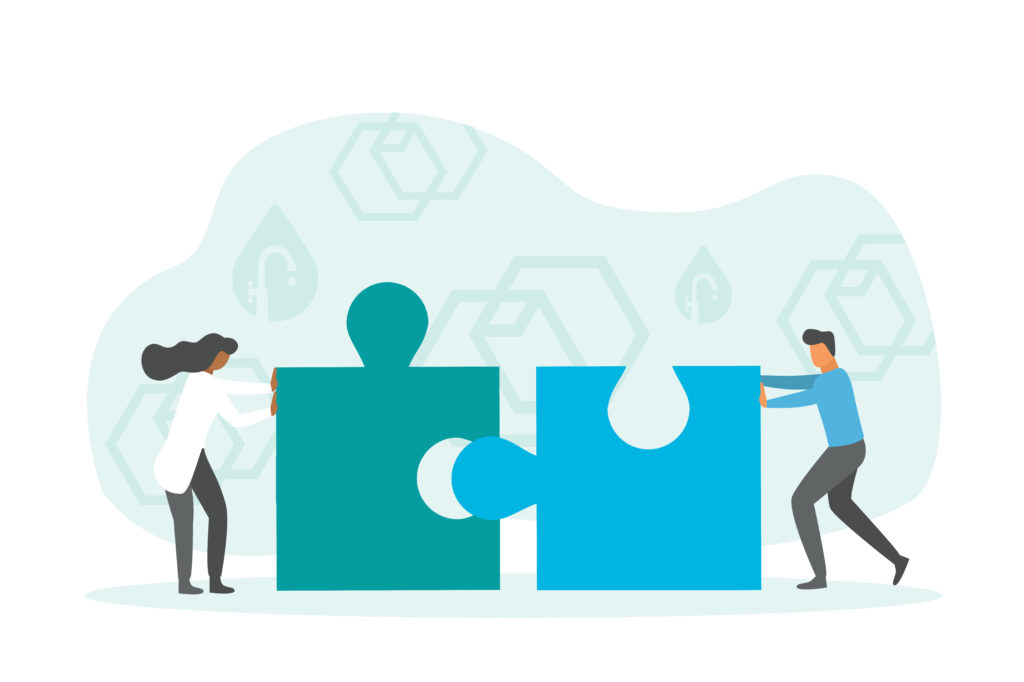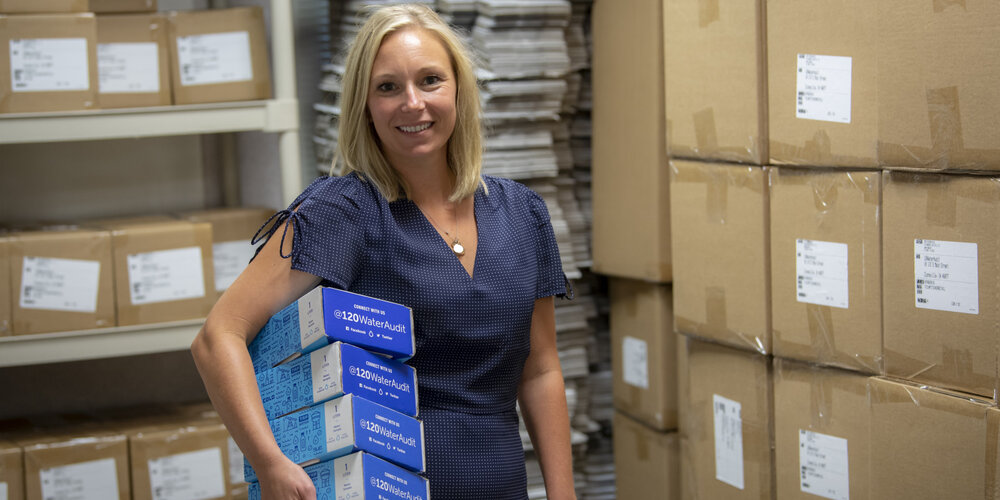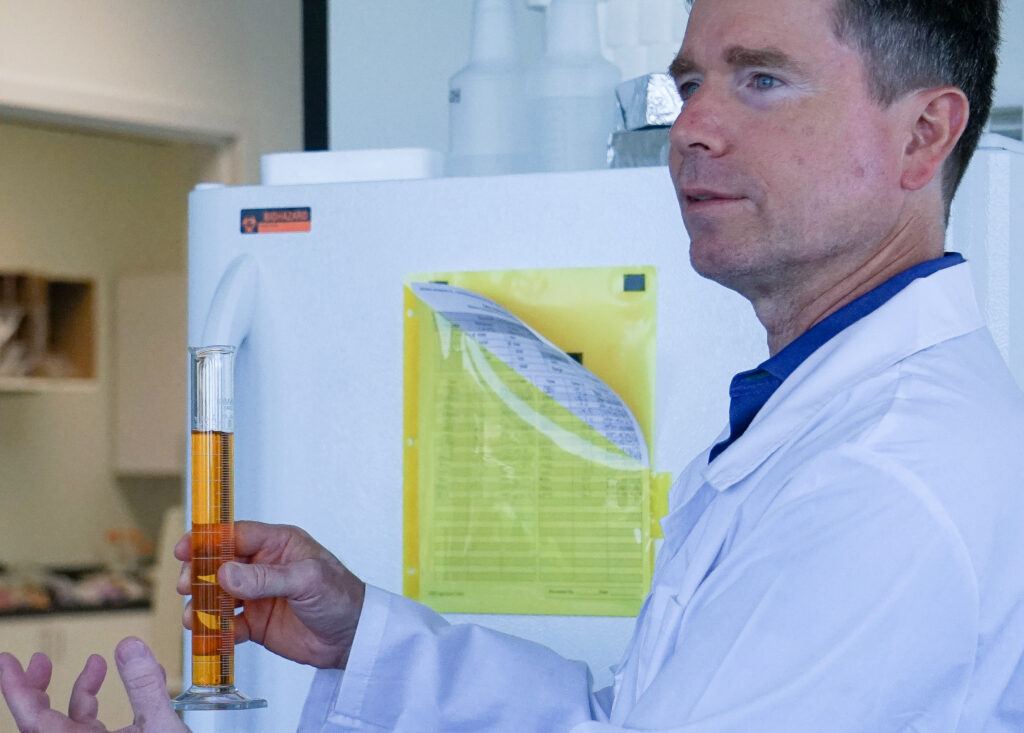How a Passion for Safe Drinking Water Led to a Powerful Public Health Partnership During the Pandemic
Historically, water has not been at the front of the minds of most Americans. We turn on the tap, water flows, and we drink without reservation. But maybe, we should think twice about what’s coming through our pipes. Major public safety tragedies from poisonous lead in Michigan to PFAS in West Virginia have revealed a troubling reality – the tap isn’t always trustworthy. And while water safety continues to go unaddressed in many communities, some have made it their life’s work to make clean drinking water not a privilege, but a right. Megan Glover, founder and CEO of 120Water, is one of those people.

Cara Chancellor: Tell us about your journey to this point. What brought you to water?
Megan Glover: Just to get it all on the table, I did not begin in the water industry. I founded 120Water in 2016, coming from more than a decade in business-to-business enterprise software, building modern cloud-based applications for various industries, such as marketing tech, the sales tech, operations, retail, and healthcare. There, I saw the benefits enterprise cloud-based technology can have on operations. In 2016 the Flint, Michigan crisis occurred. I had two young kiddos at the time… well… they’re still young, but then were very, very young! I remember talking to one of my mentors in the community in the wake of Flint and expressing deep concern about the safety of our tap water. After that conversation, I went to work after the kids had gone to bed and started researching: where can I test my water? Unfortunately, there wasn’t a solution which to me felt so silly – You’re telling me I can test my DNA by mail, but I can’t test something as essential and simple as my water?
Cara: And where did your research take you from there?
Megan: I needed to know – is my water safe? Can I make Easy Mac for the kids with it? Please, someone just give me a thumbs up or a thumbs down. Once I figured out there was not a solution online for my testing needs, I actually called my water company and said, “Hey I’d like to test my water.” And they said, “We don’t do that. You can go online and access our consumer confidence report, but we don’t test your water… you should call a lab.” So I called a commercial laboratory and they said “well, we don’t really do small-scale residential testing. If you want a full drinking water panel workup, we can do that but it’s $500.” I actually took them up on that offer, and when I got the results back, it was a foreign language. I didn’t know what the results said or meant. At that point, I quit my day job. A few entrepreneurs in the community and I bootstrapped 120Water.
Cara: It’s not easy to build a company from the ground up. How did you get 120Water up and running?
Megan: Yes. Ninety percent of all businesses fail and less than one percent actually get capitalized – in other words, one percent actually receive funding to start the business. As a woman, that percentage goes down. I understood this when I took the plunge to build this company. I was fortunate enough to find partners and investors who believed in my cause. We were able to pull a modest amount of upfront investment together and bring our first product – a consumer-friendly water testing kit – to market.
Cara: What happened after the birth of that first kit?
Megan: As a parent, my main concern was that we weren’t actually testing the taps where the populations are most vulnerable, at childcare and schools. I got on the phone and started calling superintendents and asking if they’d ever considered testing the safety of their school’s water. The answer was typically “no.” From here, I was personally going into schools and municipalities with a clipboard and paper to get the data 120 needed to get them these testing kits.

Cara: Coming from more than a decade in cloud-based technology, I can imagine going location-to-location with a clipboard felt fairly outdated for you?
Megan: Yes. It was the most antiquated work that I’ve done in my decade long career! But cloud-based technology didn’t yet exist for water. I would ask our customers “where’s your database of record I can tap into to get the locations where we need to send kits… where’s your database of record that I can automatically send these communications as opposed to having to use a third-party system like MailChimp?” The water industry was not leveraging modern technology to automate manual processes, track data, and quite frankly, make our lives easier.
Cara: How did you apply your expertise in automation to this issue?
Megan: I actually looked within the water sector like, hey, is there a CRM or an automation platform that can help me run these water safety programs? There weren’t. That’s when we realized we needed to build it ourselves. We put together our own CRM with email and logistics to actually execute these programs and build this business.
Cara: What are your longterm hopes for the water industry as a whole?
Megan: I would like to see the industry embracing innovation around real-time testing. Most water systems only manage their operation to check regulatory boxes and those are all reactionary, right? We need to get a lot more proactive with data science to actually see the full picture before it gets into the distribution system. I’m not naive, that’s not going to happen in five years, but I would hope this industry, in five years, can evolve the messaging and way of thinking around innovation.
A Partnership For Public Health
When the COVID-19 pandemic hit, many of the industry’s thought leaders found themselves wondering what public health solutions could be met by water testing. They realized early on, that solely relying on vaccines to quell the spread was not the way to go. This is when decision-makers like Megan turned to a new, much stinkier way to detect and prevent the virus – wastewater testing. By partnering with a global leader in analytical virology testing and the nation’s largest private testing laboratory, Microbac Laboratories, the 120Water team was able to apply their passion for “safe” water to a new cause – tracking the spread of Coronavirus through sewage.
Cara: Tell us about your involvement in the COVID-19 pandemic.
Megan: We had one of our statewide customers come to us during the pandemic and say, “you know we need to establish a SARS-CoV-2 wastewater network to see if the virus can be detected in wastewater.” We were interested. We had people coming to us who wanted wastewater data. I picked up the phone and started searching for a laboratory that had the testing methodologies to receive wastewater samples from our customers and be our partner in fulfilling this testing. That’s when we found Microbac Laboratories and Dr. Aaron Peacock.
Dr. Aaron Peacock: We were excited to make this partnership happen because it’s symbiotic. 120Water handles all of the logistics, while we perform the test and get the data out. The data we provide is then uploaded to a database, and from that database, the results are shared with 120Water’s customers across the country – whether that be a university, municipality, or school district.

Cara: Why did you choose to partner with Microbac for this work? I’m sure you had many options.
Megan: Yes. We had a long list of criteria for the lab we wanted to partner with and Microbac continued to check those boxes off. Being in an antiquated industry, so many times when we had these partnership conversations, the labs on the other end of the phone were just not willing to adapt to modern methods and open their mind to the goals and needs we had. I knew – probably within the first conversation with Dr. Peacock when I outlined the volume, the turnaround time, and how we ideally would want the wastewater testing process to work – that Microbac was honest, innovative, and open-minded.
Aaron: We were completely transparent with Megan and her team. When they first reached out, wastewater testing for SARS-CoV-2 was really new, and if we tried to come off as being the best lab since sliced bread, we’d be lying, right? Because there weren’t any commercial labs performing this test. It was a new frontier for everyone. We weren’t stuck on ourselves, we weren’t trying to push the hard sell, and we answered all of her questions instead of dodging around. Now, one thing we did boast about is our experience behind the bench, with viruses. We explained that both our virology lab in Sterling, Virginia, and the core lab right here in Oak Ridge, TN have some of the most respected virology programs in the country. We showed them we knew what we were talking about in that respect.
Cara: Where do you see the partnership going?
Megan: Through the pandemic, now and moving forward, Microbac continues to be a premier partner for us. We fully expect wastewater-based epidemiology to continue not just in COVID-19, but for other public health programs. Being able to provide real, approachable water testing options to everyday people across the country is a game-changer for public health and having a lab partner willing to explore more ways to keep people safe, is exciting for us.
Aaron: I’d like to continue working with them and building onto this wastewater testing program. If we can perform other testing methodologies within wastewater besides just SARS-CoV-2, there’s a lot of value there to the public. Vaccine tracking, measuring the spread of the flu and other viruses, opioid use, etc. We’ve been so busy with COVID-19 that we haven’t really explored other applications and I’m looking forward to doing so with 120.
To find out more about the Wastewater Testing offered by Microbac tap here. To explore Microbac’s Environmental Surface Testing options, tap here. To contact Peacock’s testing team directly for a complimentary quote, tap here.

This document is not intended to provide scientific or other advice to be used in a specific fact situation and is intended for general information purposes only. While we encourage you to share this document or a link to it with others, this document or any portion of it may not be quoted or used in another publication without our express permission.